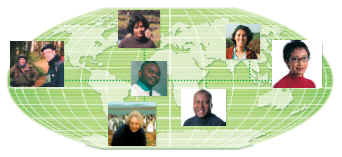From The World Bank Group: Documents
and Reports Archive
From World
Development Reports:
Selected
World Development Indicators
-----------------------------------------The Complete World Development
Report Online |
World Development Reports by The World Bank Group - the
complete series
|
World Development Report 2013:
Jobs
Moving Jobs to the Center Stage
Recent world developments have put jobs at the center of the policy
debate. The global
financial crisis has resulted in massive job losses in both emerging
and industrial countries. In
the latter, there is concern about a jobless recovery; in the former, a
comeback cannot hide
workers’ vulnerability to shocks. Political upheavals in the Arab world
highlight the discontent
of educated youth whose employment opportunities fall far short of
expectations. The political
upheavals could boost transparency and accountability in the region,
but if jobs do not follow
they could lead to greater instability.
These developments create a sense of urgency, but they remind us that
jobs are the
cornerstone of economic and social development. Most development work
is related to jobs,
even if we, as development practitioners, do not always articulate it
in that way. We approach
jobs from different angles: infrastructure development, competition,
innovation policies, or skills
upgrading. But we tend to do so in silos.
|
World Development Report 2013 by chapters
Foreword, Acknowledgments, Abbreviations and
data notes, Contents
Overview. Moving jobs center stage
Jobs wanted
Development happens through jobs
Valuing jobs
Jobs agendas are diverse...but connected
Policies through the jobs lens
Jobs are center stage, but where are the numbers?
Question: When is the
conventional wisdom right?
Notes
References
1.- The jobs challenge
A job, but not always a salary
Youth bulges, aging societies, and migrant nations
Cities, wages, and women
Jobs are changing in surprising ways
Prosperity, but a changing distribution of earnings
The role of the private sector
Vulnerability on a global scale
Question 1: What is a job?
Notes
References
Part 1.- Jobs are
transformational
2.- Jobs and living standards
Jobs improve material well-being
Jobs are more than just earnings
Jobs and life satisfaction
Question 2:Growth strategies or
jobs strategies?
Notes
References
3.- Jobs and productivity
Employment turbulence, not jobless growth
Most jobs are in a very small farms and firms
In farms, uneven technological progress
Among firms, much churning and few gazelles
Question 3: Can entrepreneurship
be fostered?
4.- Jobs and social cohesion
Jobs can help manage social tensions
Jobs (or the lack of jobs) can shape social interactions
Question 4: Can policies
contribute to social cohesion?
Part 2.- What are good
jobs
for development?
5.- Valuing jobs
Rights as the foundation
The value of jobs to individual and society
Spillovers from jobs
Can the development payoffs from jobs be quantified
Question 5: Skills or Jobs-
which come first?
6.- Diverse jobs agendas
Agrarian economies
Conflict-affected countries
Urbanizing countries
Resource-rich countries
Small island nations
Countries with high youth unemployment
Formalizing economies
Aging societies
Question 6: A targeted
investment climate?
7.- Connected jobs agendas
Migration of workers
Migration of jobs
Question 7: Competing for jobs?
Part 3.- Policies
through the
jobs lens
8.- Labor policies revisited
Question 8: Protecting workers
or protecting jobs?
9.- Beyond labor policies
Question 9: How to accelerate
labor reallocation?
Appendixes, Glossary, Bibliographical notes,
Background papers and notes
Selected Indicators
Index
|
|
 |
Education for
Sustainability
Postgraduate
courses on
Environment and
Development Education at
London South Bank University |

-
Part time distance learning
- Full time at the University
- Come visit us
at www.lsbu.ac.uk/efs |
|
- Notes for
lectures
- Notes and papers
-
Globalization
- Global Value Chains
- Integrated International
---Production
- International Division of
---Production
- Transnational Corporations
- The Triad ( U.S.A, Japan, E.U.)
|
- Dependency Theory
- Planning for Development
-
The Developmental State
-
The Neo-liberal State
- Development Economics
- The future of development
--economics
- Foreign
Direct Investment
- Factor
Payments to Abroad
- The New Economy in
--development
- International
Trade
|
Back to Global Economic
Prospects for Develeping Countries |
--World Development Indicators
---(the complete series)
--World Development Reports
---(the complete series)
-- Selected World Development
--- Indicators (the complete
series)
--World Investment Reports
---(the complete series)
--World Investment Reports
---(selected statistics)
--
Planning for Development
UNCTAD areas of work:
Globalization and Development
Development of Africa
Least Developed Countries
Landlocked Developing Countries
Small Island Developing States
International Trade and
Commodities
Services Infrastructure
Investment, Technology and
Enterprise Development
The following databases on-line
are available:
Commodity Price Statistics
Foreign Direct Investment
Handbook of Statistics
ICT Statistics
Millennium
Indicators
TRAINS
Digital
Library:
-- News
-- Main publications
-- UNCTAD Series
-- Basic documents
-- Issues in Brief
-- Newsletters
-- Statistical databases
-- Globalization and
----- Development Strategies
-- Economic Development in
----- Africa
-- International trade
-- Dispute Settlement - Course
----- Modules
-- Investment, Technology and
-----Enterprise Development
-- Services Infrastructure for
--- Development and Trade
----- Efficiency
-- Monographs on Port
----- Management
-- Technical Cooperation
-- Discussion papers
-- G-24 Discussion papers
-- Prebisch Lectures
-- Transnational Corporations
----- Journal
-- Publications Survey 2006-
-----2007
|
Search:
A B C D E F G H I J K L M N O P Q R S T U V W X Y Z |
World indicators on the environment
World Energy Statistics - Time Series
Economic
inequality
|
|
Other
related themes:
- Aid
- Bureaucracy
- Debt
- Decentralization
- Dependency
theory
- Development
- Development
Economics
- Economic
Policies
- Employment/Unemployment
- Foreign
Direct Investment
- Gender
- Human
Rights
- Human
Development
- Hunger
- Inequality/social exclusion
- Informal
sector
- Labour
Market
- Microfinance
- Migration
- Poverty
- Privatization
- PRSP
- State/Civil
Society/
---Development
- Sustainable
Development
- Transnational
Corporations
- Urbanization
- Complete
list of development themes
WDR
1995 : Workers in an Integrating World
This
eighteenth annual report assesses what a more market-driven and
integrated world means for workers. It asks which development
strategies best address workers’ needs, and....
World Development Report 1994
examines the link between infrastructure and development and explores
ways in which developing countries can improve both the provision and
the quality....
This report examines the
interplay between human health, health policy and economic development.
Because good health increases the economic productivity of individuals
and the economic ....
The World Development Report
1992 explores the links between economic development and the
environment. The 1990 report on poverty, 1991 report on development
strategies, and this report ....
This report synthesizes and
interprets the lessons of more than forty years of development
experience. Together with last year’s report on poverty and next year’s
on ....
This report is about the
poor. It is thus about the fundamental issue in economic development:
the eradication of poverty from the world. The report defines poverty
in broad terms, ....
Economic growth rates among
the developing countries have varied considerably. The external
environment has had an adverse impact on growth, but domestic policies
have been more important....
Part I reviews recent trends
in the world economy and their implications for the future prospects of
developing countries. Part II examines the role of public finance in
development....
Part I reviews recent trends
in the world economy and their implications for the future prospects of
developing countries. It stresses that better economic performance is
...
The world economy is entering
its fourth year of growth since the recession of 1982. Yet the recovery
is hesitant with many developing countries facing serious problems of
adjustment....
This report focuses on the
contribution that international capital makes to economic development.
While the report pays close attention to the events of the recent past,
it also ....
Long-term needs and sustained
effort are underlying themes in this report. The first part looks at
economic performance, past and prospective. ....
This report reviews trends in
the international economy and their implications for the developing
countries with a special focus on the management and institutional
aspects of ....
This report reviews
development prospects in the international economy and supplements the
extensive discussion of adjustment issues in the 1981 WDR. It finds
that, although ....
Adjustment, global and
national, to promote sustainable growth in the changing world economy
is the main theme of this report. Recession and inflation in the
industrial countries, ....
Developing countries start
the decade facing two major challenges: to continue the social and
economic progress of the past 30 years in an international climate that
looks less helpful; ....
WDR
1979 : Structural Change and Development Policy
Structural
transformation is particularly important for middle income countries.
In dealing with the appropriate policies to be associated with
structural changes, this report analyzes ....
WDR
1978 : Prospects for Growth and Alleviation of Poverty
This first
report deals with some of the major development issues confronting the
developing countries and explores the relationship of the major trends
in the international economy to ....
The report states that
localization – the growing economic and political power of cities,
provinces, and other sub-national entities – will be one of the most
important new....i
The report analyzes the risks
and opportunities that the global information revolution is creating
for developing countries, and concludes that access to financial,
technical, and medica.....
The report is devoted to the
role and effectiveness of the state: what it should do, how it should
do it, and how it can improve in a rapidly changing world. Governments
with both centrally-planned....
This World Development Report
examines the transition of countries with alternative systems of
centrally planned economies back to a market orientation. These
countries seceded from....
This eighteenth annual report
assesses what a more market-driven and integrated world means for
workers. It asks which development strategies best address workers’
needs, and....
World Development Report 1994
examines the link between infrastructure and development and explores
ways in which developing countries can improve both the provision and
the quality....
|
|